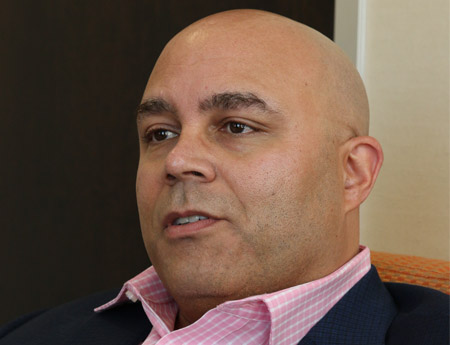Powell: Cable Is Already A Managed Service

The smarter way to stay on top of broadcasting and cable industry. Sign up below
You are now subscribed
Your newsletter sign-up was successful
National Cable & Telecommunications Association president Michael Powell defended managed services in a C-SPAN interview this week, saying that over 80% of the cable pipe currently is dedicated to delivering such a managed service: "It's called cable."
Powell was interviewed for C-SPAN's Communicators series, a copy of which was supplied to B&C/Multi.
He said that cable should absolutely be allowed to deliver managed services. "We spent multiple decades building a private proprietary infrastructure" to deliver that managed, specialized service.
He said to say cable companies ought not to be able to offer managed services over that pipe is tantamount to "confiscation of our business. It is essentially the argument that you should demand as a matter of law that you take away our private service and put it in the public domain."
He said that cable only uses a portion of that pipe for the public Internet, but that the majority goes to other services that the cable industry develops. "The reason that your cable channel doesn't glitch or cache or pixilate or can be high definition is because it can be highly prioritized and managed."
He said that unless cable itself should not exist as a private service, then one has to at least concede that managed services have consumer-benefitting purposes. "We are not government owned rights of way," he said. "We built our infrastructure with purely private capital to sell a service to the American public, and I think the government has to be careful not to suggest that, even for a public purpose, that somehow you can remove those services and repurpose them for something that a regulator might prefer to see them used for."
Powell talked extensively about network neutrality. That included defending FCC chairman Tom Wheeler against suggestions he was trying create fast and slow lanes with his new net neutrality rules, which Powell called a complete distortion. "The chairman is not proposing that we should have fast lanes," said Powell, himself a former chairman. "He is dealing with the boundaries of the law as interpreted by the court, and I think he personally is trying to create the strongest net neutrality rule he can within the parameter of what the law provides."
The smarter way to stay on top of broadcasting and cable industry. Sign up below
The FCC's old rules prevented unreasonable discrimination, but a court found that a ban was too much like common carrier regs, so Wheeler is flipped that to be allowing "commercially reasonable" discrimination, but also signaled that is basically a way to get at the same limits on discrimination and have it be sustainable in court.
That said, Powell said he was perplexed by the fast lanes charge. He said he isn't even sure what it is, and that whatever it is, he has talked to his members and, as far as he can tell, nobody is contemplating creating one. "I believe this issue has blown beyond the proportion of our actual incentives and interests."
He said cable operators would be "crazy" to do some of the things people are suggesting, and that the fight was not really about network neutrality. He said NCTA supported the last rules and was sure they would support the next ones "depending on how they come out." That caveat has mostly to do with Title II, which NCTA would not support were that to be the justification for the rules.
He also pointed out the old rules are now part of cable ops terms of service. Unless those terms of service are changed, that means the rules are also legally enforceable by the Federal Trade Commission according to some rule watchers.
But Powell made it clear that support stops when Title II enters the picture. "For one rule we are not going to support radically transforming the regulatory model to Title II," he said, which would reclassify Internet access as a telecom service. Powell said that was like using a chainsaw, sledgehammer and bulldozer to tackle one part of one rule—the anti-unreasonable discrimination portion of the open Internet order (the no-blocking rule is not really at issue, and the court left the transparency rule alone).
He said the benefits of that approach are essentially nil, while the risks are monumental. He called Title II "about the only thing we're in the mood to really be fighting over."
He called it "radically disastrous" for the country, and something that would "certainly damage our businesses and I think would hurt consumers much worse than people generally understand and Web companies more than they understand." That "hurt" includes raising rates (mandatory USF fees), and removing the Federal Trade Commission's oversight over privacy and other consumer protections.
Powell said he could also easily see a range of innovative services getting tangled up in that regime.
Powell said that Title II would increase the cost of regulatory compliance, which would then shrink investment in growth. "So, if you like your Internet speed today, sadly you might have to get used to it because I think the investment needed to grow it will shrink."
He said the market was already reacting negatively to the "overhang" of Title II. "Telecom stocks in them most booming stock market in world history right now are down because of threat of Title II."
Contributing editor John Eggerton has been an editor and/or writer on media regulation, legislation and policy for over four decades, including covering the FCC, FTC, Congress, the major media trade associations, and the federal courts. In addition to Multichannel News and Broadcasting + Cable, his work has appeared in Radio World, TV Technology, TV Fax, This Week in Consumer Electronics, Variety and the Encyclopedia Britannica.

